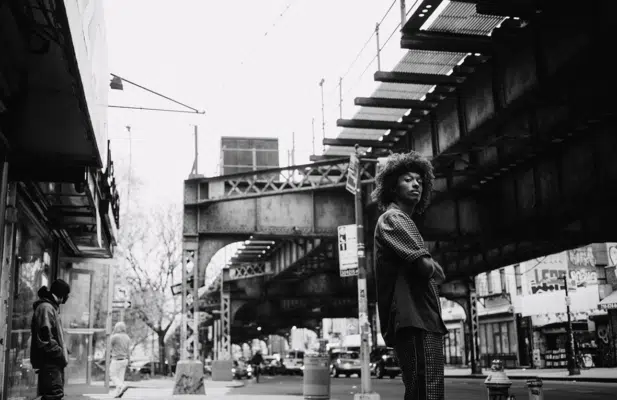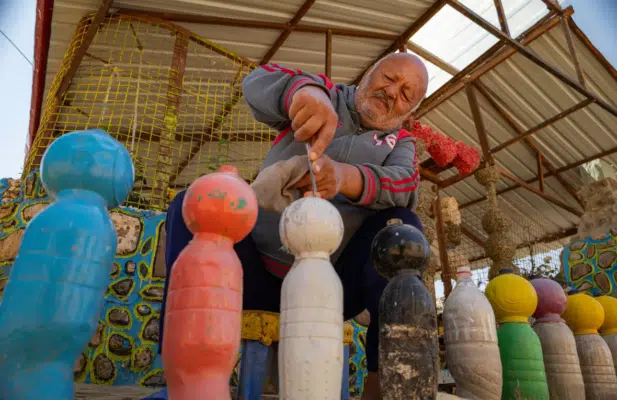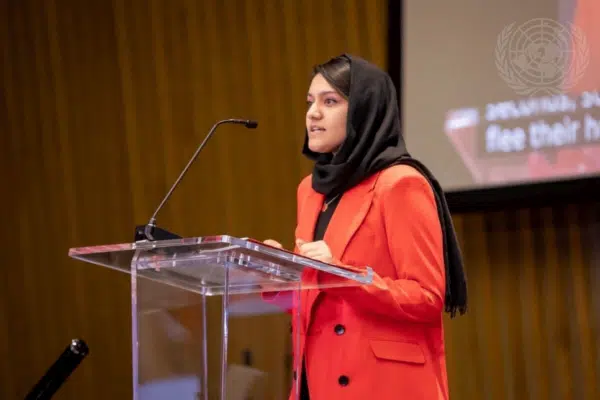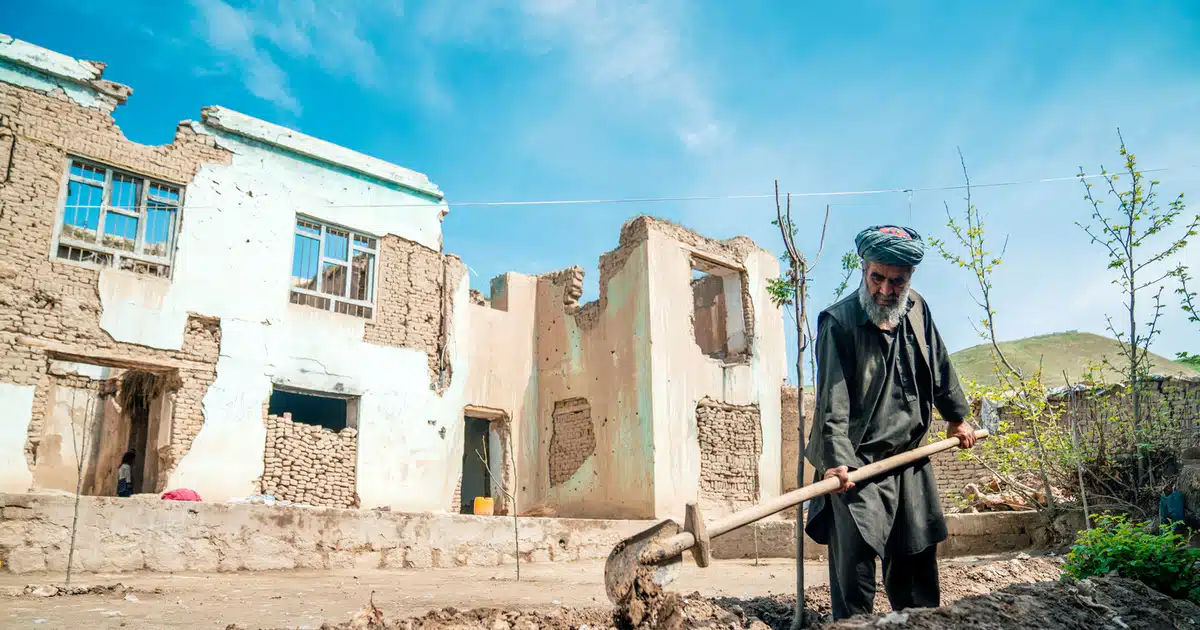
Muhammad Zubaid plants a tree in front of the ruins of his destroyed house in Janat Bagh village in north-eastern Afghanistan’s Kunduz province. © UNHCR/Oxygen Empire Media Production
After many years of conflict, close to 1.4 million internally displaced Afghans have returned to their places of origin since 2021 and are getting support to work towards a better future
By Caroline Gluck in Kunduz province, north-eastern Afghanistan
Once known for its beautiful orchards and greenery, Janat Bagh village (“Paradise Garden” in English), in north-eastern Afghanistan’s Kunduz province, bears the scars of seven years on the frontline of an active conflict. The fighting left nearly every building damaged or completely destroyed.
“Airplanes were bombarding this area,” said Mohammad Yunus Safizada, 36, pointing to the surrounding hills. “A very dangerous war has been fought here.”
He and his family abandoned the only home they had ever known and fled to Takhar province and then Kunduz. Like many displaced families, they struggled with the high costs of renting housing and finding work.
“It’s a good feeling to come back.”
But since last May, after the village was cleared of mines by the UN Mine Action Service, families like Yunus’s have slowly started to return.
“It’s a good feeling to come back and live here again, to live in the place where I and my father grew up,” said Yunus.
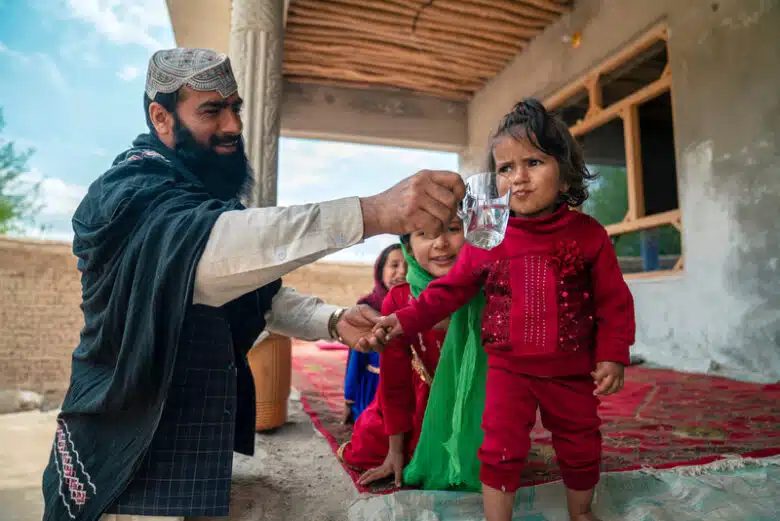
Mohammad Yunus Safizada and his family moved into their newly rebuilt house 10 days ago. © UNHCR/Oxygen Empire Media Production
Destroyed homes rebuilt
His family is one of 24 households in the village that have, so far, received grants from the UN Refugee Agency, UNHCR, to help them rebuild their destroyed homes. Across Afghanistan, 28,700 people benefitted from similar shelter assistance to rebuild in 2022 while close to 213,000 received help to repair their homes or cover rent.
In Janat Bagh, a deep, solar-powered well and reservoir have also been installed in the village and there are plans to build a new school this year – with a foundation slab already laid – and two community centres, one for men and one for women. Other agencies are looking at supporting agriculture activities.
Yunus moved into his new house, which is fitted with solar panels, just 10 days ago. He is already busy planting a new vegetable garden in the front yard where he hopes to raise onions, cucumbers, tomatoes and okra.
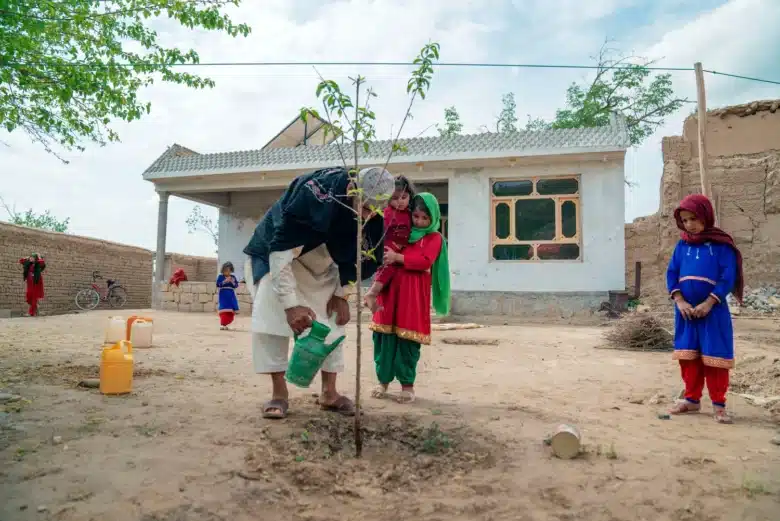
Yunus waters a newly planted sapling in his front yard. © UNHCR/Oxygen Empire Media Production
“The first time I returned, I was very sad; it was a very green village before with fruit trees and when I came back, everything was destroyed. Now lots of changes have come,” he said. “There is peace. If we leave the door open at night, if we walk around the village at night or day, we don’t feel any danger. We’re comfortable now.”
His neighbour, Mah Gul, 40, is also living in a house newly-built with UNHCR support. The mother-of-five lost her husband five years ago when he was shot after trying to return to the village to earn money as a tractor driver.
“We used to live in other peoples’ houses. When we came back to the village, we were very sad and scared – the village and houses were completely destroyed,” she said.
“Since UNHCR started helping here, people returned to this village gradually and houses got built. My children will live better here,” she said.
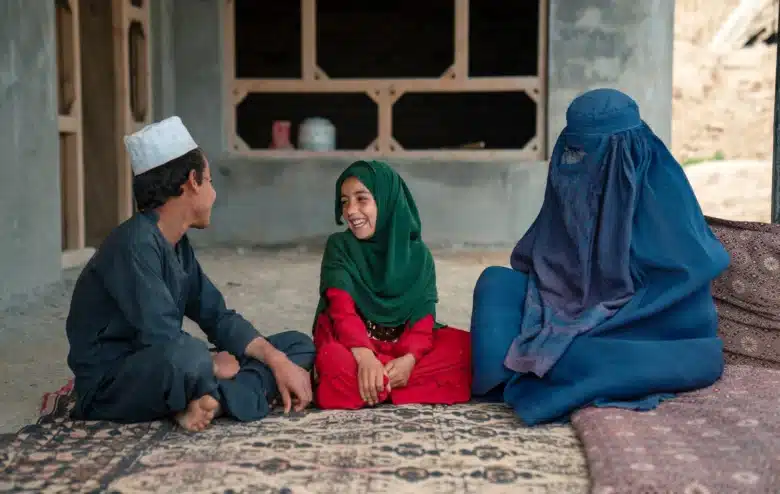
Mah Gul with two of her five children in their newly-built home in Janat Bagh. © UNHCR/Oxygen Empire Media Production
Every family here struggled in displacement, moving many times and becoming mired deeper in debt, unable to pay rent and struggling to feed themselves. Many also said they felt socially ostracized. Around a quarter of the villagers have now returned and want to rebuild their village, even if, like 62-year-old Muhammad Zubaid, they do not yet have new houses of their own.
Zubaid voluntarily gave up some of his own land so that a communal well and reservoir could be built on it, and giant solar panels installed, providing everyone in the village with clean water. What remains of his house – the walls falling down and scarred with bullet and shell marks – stands next to his nephew’s newly-built home. Zubaid comes to the village every day from a nearby village, where he is currently living, to cultivate his crops. “If we get help to rebuild, 100 per cent I will bring my family today,” he said.
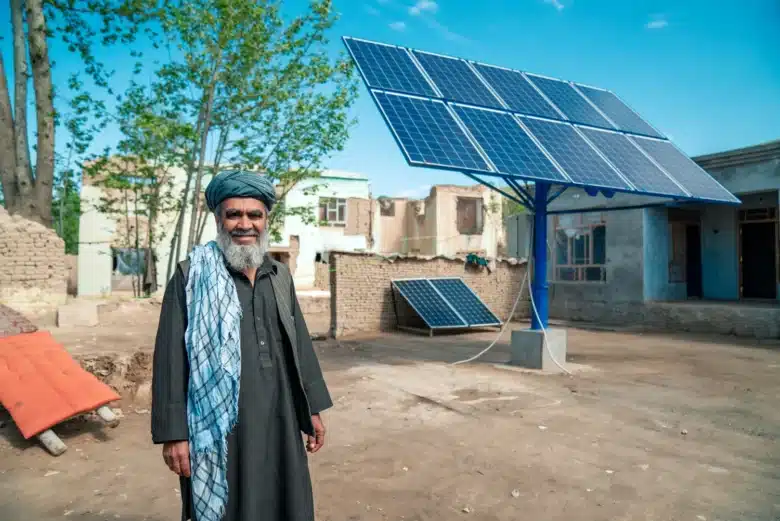
The courtyard of the house where Muhammad Zubaid grew up is now host to two giant solar panels which power the village’s water system. © UNHCR/Oxygen Empire Media Production
Creating resilient communities
The village is located in a Priority Area of Return and Reintegration (PARRs) – one of 80 areas in Afghanistan where UNHCR is working with other agencies to install basic services and livelihood support for displaced people and refugees choosing to return. The aim is to create resilient communities less vulnerable to future displacement.
Across Afghanistan, however, the humanitarian needs are dire. According to the UN World Food Programme, nearly 20 million people (half the population) are acutely food insecure, six million of whom are one step away from famine, mainly as a result of the economic crisis that has gripped Afghanistan since August 2021. Decades of conflict, climate shocks and severe restrictions on the rights of women and girls to work and study have compounded the situation.
A December decree banning Afghan women from working for most NGOs has been particularly damaging for aid efforts. In April, the de facto authorities extended the ban to include women working for the UN.
UNHCR and partner female staff are vital to ensuring critical and life-saving support reaches those most in need. The agency continues to advocate for the full inclusion of women to ensure assistance can be delivered to women and girls.
Many of the returnees in Janat Bagh are still living in tents and some are struggling to find work to support their families, but more will benefit from shelter support and other services planned for this year.
“It is very important to have the house,” said Juma Khan, who received a grant to rebuild. “Even if we are hungry, we can live with peace of mind and feel relaxed.”
Originally published by UNHCR on 12 July 2023.



